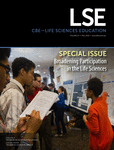Mentoring for Inclusion: The Impact of Mentoring on Undergraduate Researchers in the Sciences
Abstract
Increasing inclusion of underrepresented minority and first-generation students in mentored research experiences both increases diversity in the life sciences research community and prepares students for successful careers in these fields. However, analyses of the impact of mentoring approaches on specific student gains are limited. This study addresses the impact of mentoring strategies within research experiences on broadening access to the life sciences by examining both how these experiences impacted student success and how the quality of mentorship affected the development of research and academic skills for a diverse population of students at a public, minority-serving institution. Institutional data on student grades and graduation rates (n = 348) along with postresearch experience surveys (n = 138) found that students mentored in research had significantly higher cumulative grade point averages and similar graduation rates as a matched set of peers. Examination of the relationships between student-reported gains and mentoring strategies demonstrated that socioemotional and culturally relevant mentoring impacted student development during mentored research experiences. Additionally, extended engagement in research yielded significantly higher development of research-related skills and level of independence in research. Recommendations are provided for using mentoring to support traditionally underrepresented students in the sciences.



